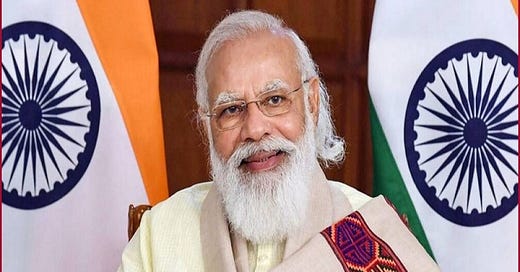The White House Press Secretary’s Praise Of Modi Reaffirms His Rising Global Leadership
This makes Prime Minister Modi the only world leader to win both Russia and the US’ approval, which speaks to the success of India’s careful balancing act in the New Cold War.
The Ukrainian Conflict changed International Relations in far-reaching ways, practically all of which are considered to be negative. The global systemic transition to multipolarity, which predates the top proxy war of the New Cold War by a decade and a half according to those analyses that regard the 2008 financial crisis as the tangible start of this process, has become unprecedentedly chaotic. Be that as it is, one outcome has emerged that’s indisputably positive, and that’s India’s rising role in global affairs.
By decisively intervening to function as Russia’s irreplaceable valve from Western sanctions pressure, India preemptively averted the scenario of its partner potentially becoming disproportionately dependent on China. It also perfected its careful balancing act between the US-led West’s Golden Billion and the jointly BRICS- and SCO-led Global South of which it’s a part, thus emerging as the kingmaker in the New Cold War, the observation of which was recently reflected in three influential articles last week.
Prior to this assessment going mainstream, it was none other than President Putin who drew global attention to India’s newfound role in the emerging Multipolar World Order upon praising Prime Minister Modi for his independent foreign policy at the end of October. The Russian leader appreciated his counterpart’s brave defiance of the Golden Billion’s sanctions pressure and related information warfare that aimed to guilt him into unilaterally conceding on his country’s objective national interests.
The result of this pragmatic policy of principled neutrality is that India was able to successfully bridge the divide between the G20 countries when it came to agreeing on the wording of their joint statement. This globally significant political achievement confirmed India’s rising role in global affairs, which was already in progress prior to the Ukrainian Conflict but was immensely accelerated as a result of its leadership masterfully tapping into the grand strategic opportunities connected to it.
Even White House Press Secretary Karine Jean-Pierre, whose declining unipolar hegemon had hitherto exerted maximum information warfare pressure on India to coerce it into dumping Russia, publicly recognized the new global role played by Prime Minister Modi. In her press conference on Friday, she praised him for facilitating the G20 joint statement as well as drawing attention to pressing issues of concern for the Global South such as the food and fuel crises in his speech at that event.
This makes Prime Minister Modi the only world leader to win both Russia and the US’ approval, which speaks to the success of India’s careful balancing act in the New Cold War. His Great Power’s rapid rise as a truly independent pole of influence in the emerging Multipolar World Order will help counteract some of the destabilizing consequences for the global systemic transition that were unleashed by the Ukrainian Conflict, which is in all responsible stakeholders’ interests.
The G20 would have failed had it not been for the Indian leader’s “essential role in negotiating the summit’s declaration” as Jean-Pierre accurately described it, which would have led to much more global uncertainty. Furthermore, by serving as the voice of the Global South, Prime Minister Modi was able to position India as their informal leader. That could in turn contribute to them following its lead in continuing to practice their policies of principled neutrality in the New Cold War.
While this outcome goes against the US’ interests with respect to ensuring that they don’t dump Russia like it’s unsuccessfully sought to pressure them all to do, it also means that they won’t dump the US either despite their comprehensively expanding relations with China, which thus serves US interests. With this in mind, it can be said that America tacitly approves of India’s efforts to assemble a new Non-Aligned Movement (“Neo-NAM”) in the New Cold War, ergo Jean-Pierre’s praise of Prime Minister Modi.
Extrapolating from this insight, her words wouldn’t have been shared had the US not acknowledged that the global systemic transition to multipolarity is irreversible, the trajectory of which was made certain as a result of India’s rising role in global affairs brought about by the Ukrainian Conflict. Had this Great Power not masterfully tapped into the grand strategic opportunities connected to that proxy war as was earlier explained, then the future direction of the aforesaid transition would still be in doubt.
Instead, by cleverly seizing the moment, India ended up ensuring that multipolarity is inevitable. That outcome, however, doesn’t imply that the US can’t benefit. Rather, it’ll seek to leverage the grand strategic opportunities connected to India’s de facto leadership of the Neo-NAM to continue balancing China, which is the only country capable of competing with it in any systemic way. This insight thus accounts for America’s approval of India’s rising global role despite previously trying to suppress it.
The takeaways from Jean-Pierre’s praise of Prime Minister Modi are therefore several. First, it signals that the US will likely relieve some of its infowar pressure on India. Second, this could be done since America now approves of its partner’s rising global role. Third, the preceding insight suggests that the US acknowledges that multipolarity is now irreversible. Fourth, it believes that it can still benefit from this emerging system. And finally, the US hopes to use the informally Indian-led Neo-NAM to that end.




